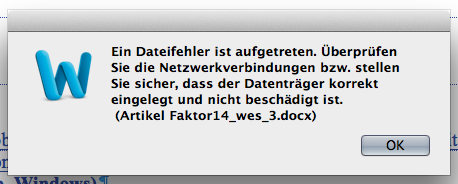“Excuse me, one question, how do I write a book?”
“A book is difficult to write, forget about it, you’re not going to finish it anyway.”
Me and my German teacher in school (half-remembered, it’s been a while; and no, it was not reverse psychology)
It’s a strange time — on the one hand, the tools are available for everyone (who reads this) to write a book — you have programs for writing and for layout available, even book on demand services for printing. On the other hand, writing a book is hard work. Sure, there are some books that seem to be “instant effortless successes”. But don’t let it fool you — writing a book is hard work.
I have given some tips about writing books on pages 336f (Acrobat: 169f), but I’d like to deal with a few misconceptions about writing books here, as I recently had a conversation about the difficulties of writing books.
Misconception #1: Writing is Fun
Writing can be fun — at times. But writing is also a job — a hard job. It is complex, it takes a lot of ideas (hopefully, you have collected them earlier), it takes time and effort. You can make it easier by writing about a topic you love, but even that love will have its ups and down in the writing process. The problem with writing is that you do not see the amount of work the author has put into his/her work. Unless of course, they write about it:
“Writing a book is an adventure: to begin with it is a toy and amusement; then it becomes a master, and than it becomes a tyrant; and the last phase is just as you are about to be reconciled to your servitude – you kill the monster and fling him to the public.”
Winston Churchill
So, yes, sometimes you have to slug it out. Or to use another Churchill-attributed quote:
If you’re going through hell, keep going.
Winston Churchill
Misconception #2: Writing is Inspiration
There is a nice study that compared 3 groups (cited in the great book “How to Write a Lot” by Silvia): people who were given not instructions, people who were given the instruction to write only when inspired, and people who should write each day, no matter how inspired they were. The last group wrote more and had better ideas. Inspiration is overrated — at least if you wait for it. Simply sit down and write is the better strategy. Or to use a quote:
“Serious writers write, inspired or not. Over time they discover that routine is a better friend to them than inspiration.”
Ralph Keyes
Luckily, there are ways to make writing easier — see the book on pages 336f (Acrobat: 169f).
Misconception #3: You simply Write
Part of writing is research — intensive research. Collecting material, ideas, etc. Few if any people can simply sit in front of a piece of paper or a word processor and simply write down a story. It takes planning, organization, structure. There are a lot of tools you can use to make this much, much easier (or even achievable in the first place). I highly recommend Circus Ponies Notebook for creating content outlines (see book page 338f; Acrobat: 170f), and/or the postings about Circus Ponies Notebook, Content Outlines, and the difference between content and structure outlines). It certainly isn’t a strategy for every person or writing project, people differ, writing styles differ, but I think it’s worth a look in any case.
Misconception #4: A Wordprocessor like Microsoft Word is the Tool for Writing Books
Sure, Microsoft Word is common, but so are cockroaches. Word (or its clones) gives you essentially an endless scroll to write upon. You can use files for chapters, but then you have to jiggle with multiple documents. Word might be good for serial letters or the like, but it is not a good tool for writing books (even without the instability problems — seriously, Word sucks the fun out of writing(*)). A much, much better program is Scrivener. It takes an hour or two to see its strengths and understand it, but once you do, you never want to go back. It’s programmed by someone who understands authors and their requirements. There are also other programs available, but frankly, I stopped looking after I found Scrivener. You find more information in this posting (it’s old, but still valid).
Not a misconception: Writing is very rewarding
Whereas writing a book takes huge amounts of time, effort, skill (which you can learn and develop over time), it is a very rewarding enterprise. You communicate with the reader about a subject you (hopefully) love — and, more importantly, you (hopefully) have something good to say about. After all:
To sit alone in the lamplight with a book spread out before you, and hold intimate converse with men of unseen generations — such is a pleasure beyond compare.
Kenko Yoshida
So, yes, writing a book is hard, but it is also manageable, and possible, and very very rewarding. Not necessarily in money, but in the pleasure of having created something worth reading and in having done a good job.
Happy writing 🙂
(*) Just two examples from today — when I was forced to use Word (writing partner used it):


Seriously, Word is the worst software I have ever used. For every minute I am using it, I age five.
The Google Plus Scrivener User community is a public community with over 100 members. You do not have to join the community in order to read the community page. All Scrivener users are welcome to join and participate.
Here is the link: https://plus.google.com/communities/109597039874015233580
James Shewmaker
Hoi James,
thank you for this tip 🙂
All the best
Daniel